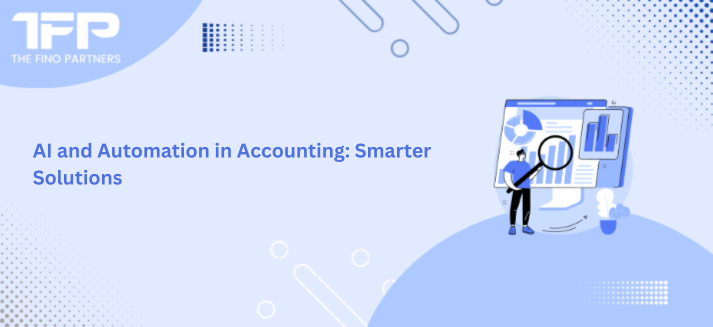Are you noticing how even small businesses are using AI to handle their finances nowadays? With inflation worries, tax season stress and startup expenses all climbing nationwide, you are not the only one wondering how to make your accounting more effective, less error-prone and cheaper.
That is exactly where AI and automation in accounting step in. Whether you operate a startup in Austin or a boutique design company in Seattle, smarter tech can do jobs which used to require hours of manual labor. From data entry and tax filing to economic forecasting, AI is transforming the way businesses like yours manage money.
And for all those operating or developing AI-led platforms themselves, the right Accounting services for AI businesses is essential, not only for compliance but also for long-term development and investor trust.
Let us see how AI is changing accounting and exactly why it might be your smartest upgrade your business can make this year.
What is AI in Accounting?
AI in accounting is the usage of Artificial Intelligence techniques (machine learning, robotic process automation (RPA), along with natural language processing (NLP)) to automate, analyze and improve financial tasks.
AI-powered tools enter transactions, scan invoices and reconcile bank statements instead of you or your accountant manually entering transactions. They "learn" patterns, flag inconsistencies and even predict future financial patterns.
What is the Role of Automation in Accounting?
Automation in accounting essentially means using software to do regular things without having any manual intervention. This includes automating:
- Invoice processing
- Payroll
- Bank reconciliation
- Tax filings
- Expense categorization
- Tracking cash flow
You set the rules, the software follows—fast, accurately, and 24/7.
Why AI & Automation are Important for Your Business in 2025?
Whether you are a startup, an expanding SMB or part of a bigger AI-focused organization, here is how smart accounting solutions powered by AI and automation aid:
- Save Time on Repetitive Work
No more hours entering receipts or even chasing missing invoices. AI software for accounting scans and pulls data from receipts, email messages and bank statements in one second. - Reduce Human Errors
Everyone makes mistakes in manual bookkeeping, particularly during tax season 2025. AI gets rid of this danger by catching inconsistencies instantly, meaning cleaner books and fewer audit concerns. - Real-Time Financial Reports
It is old news to wait for end-of-month reports. With AI, you get live-time dashboards with revenue, expenses, profits and projections, whenever you would like. - Better Financial Forecasting
With AI financial analysis, businesses can now see cash shortages ahead of time, project growth and spot risky spending habits. - Scalability Without Hiring
When your business grows, your transactions expand with it. AI tools scale together with your company without you needing a complete finance team on the job.
What Are Some AI-Powered Smart Accounting Solutions?
To see what types of AI-based features are really available, here are some of the very best automation tools in contemporary accounting software:
Automated Data Entry
AI reads receipts, invoices and bank statements with Optical Character Recognition (OCR) and also inputs the data to your accounting system immediately.
Matching Invoices
AI tools match invoices against purchase orders instantly, detecting mismatches instantly.
Bank Reconciliation
AI synchronizes with your bank feeds and matches outgoing and incoming payments with your records.
Alerts on Tax Compliance
AI systems track tax regulation changes and ensure your filings are always correct and on time.
Predictive Cash Flow Tools
Machine learning models evaluate historical financial trends and predict upcoming expenses, slower sales periods or investment opportunities.
Benefits of AI and Automation in Accounting
Let’s now look at some of the top benefits of AI and automation in accounting for your business:
|
Benefit |
What It Means for You |
|
Time-Saving |
Focus more on strategy, not spreadsheets |
|
Fewer Errors |
Sleep easier knowing your numbers are accurate |
|
Faster Financial Insights |
Get reports and dashboards on demand |
|
Better Tax Compliance |
Avoid IRS penalties and late filing fees |
|
Scalable Bookkeeping |
Grow your finances without growing your team |
|
Proactive Decision-Making |
Use data to make smarter moves before problems arise |
Best AI Software for Accounting in the U.S.
Some leading tools integrate AI into their accounting. Below are some of these softwares which are typically used in the U.S.:
- QuickBooks Online Advanced – Performs transaction categorization & invoice management automatically.
- Xero – With AI for banking reconciliation & cash flow prediction.
- FreshBooks – Invoicing, time tracking & expenditures using automation.
- Zoho Books – AI-powered insights and automated workflows.
- Vic.ai – Specialized AI accounting assistant for invoice processing & approval.
Each has its own strengths and can be chosen based on your business size, market or budget.
How is AI Transforming the Role of Accountants?
AI will definitely not replace accountants, though it will make them a lot more valuable. With repetitive duties out of the way, accountants can concentrate on:
- Financial strategy
- Business consulting services
- Budget optimization
- Tax strategy planning
- Risk analysis
For companies, especially tech-focused startups, Accounting services for AI businesses can now provide deep financial insight, cash flow modeling and investor reporting via AI-enhanced tools.
What Are the Challenges of AI in Accounting?
Of course, not all things are perfect. Things to mind when using AI in accounting:
- Learning Curve
Some tools require time to master and set up. That is where a tech-savvy accountant comes in handy. - Data Security
Use cloud-based AI tools only if the provider follows appropriate data privacy and encryption standards. - Initial Costs
There might be upfront subscription or integration charges, however the ROI usually outweighs the expense over time.
What Startup Founders & Tech Businesses Should Prepare For
In case you operate a startup, particularly one in AI, e-commerce or SaaS startup, your financial reporting requirements are generally more complicated. This is where specialized accounting services for Saas startups, AI companies and e-commerce companies can help:
- Set up smart systems from the beginning
- Remain investor-friendly and audit-ready
- Make accurate revenue models and projections
- Use AI tools to scale up your startup
Also Read | Accounting and Management Services for Your Business: A Complete Guide
Final Thoughts
AI and automation in accounting are no longer optional ideas, but they are resources for companies wanting to work smarter, not harder. So, if you are a founder, CFO or freelancer, these intelligent accounting solutions can save you time, insights and worry.
And in case you operate an AI-focused business yourself or wish to scale fast with minimal overhead, look into accounting services for AI businesses which understand your requirements and utilize the newest technologies to assist you better.
Get in touch with The Fino Partners today.




























